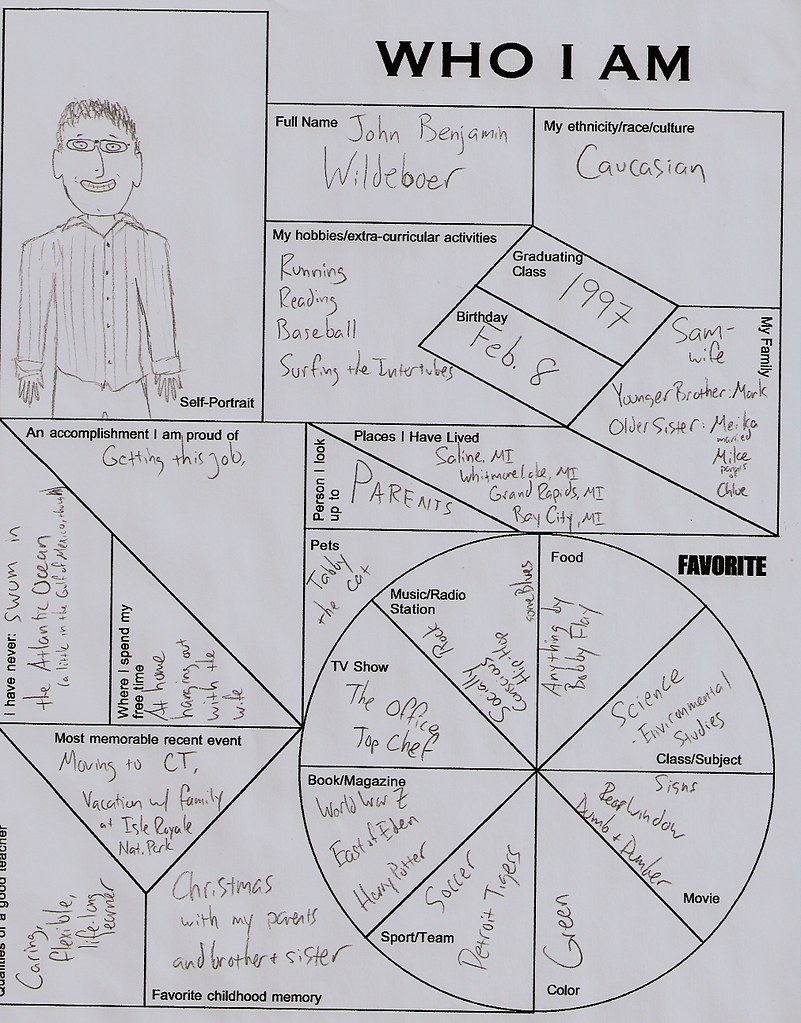My post on plans for my first day with students included Dan Meyer's "Who I Am" sheet. I just thought I'd share my completed sheet, in case you were interested. 🙂
Week 1 = Done
Week one of my new job is done! We only had students on Thursday and Friday (today), but the rest of the week was jammed full of "professional development" and meetings. This semester I have mainly upper level freshman classes, which means the last couple days has involved lots of wide eyes and not a lot of conversation. The students were just starting to open up a little bit today.
Observations on my new school and job so far:
- They've done an excellent job keeping class sizes down. Science classs are capped at 24. If it's a lower level class, they're capped at 15. It's not just a "desired-but-not-implemented" goal either.
- Technology-wise, the perception within the school is that they're ahead of the curve. They have LCD projectors, a few interactive whiteboards, and six laptop carts (for 1400-1500 students). From my perception they're behind the curve. I miss networked copiers, dual-screen LCD/computers, and four laptop carts for 400 students.¹
- I'm bugged that no staff meetings, professional development, or other teacher events seem to start on time. They've all actually started between 10-15 minutes after the scheduled time.
- I'm clueless on a lot of school policies and procedures, and I'm not sure who to go to for information. They need a cheat sheet of some sort for this stuff.
Overall, I'm definitely glad I'm here. It seems like it'll be a good fit, though there's some culture shock coming from a small school in Michigan to a large school in Connecticut. I feel like I'm subbing for someone else. It doesn't feel like my school, or my classes, or my classroom yet. I guess it takes a bit for 6 years of growing accustomed to a certain environment to wear off.
_________________________________________________________
¹ Though interestingly enough, most staff and students at my old district seemed to feel as if we were behind most schools in the tech department.
Ready for day 1
Despite the problems I've been having lately with my new position, I feel (mostly) ready to go for day one. As part of my continuing crusade against my previously poorly designed presentations and handouts, I decided to peruse what my blogosphere (the one in my aggregator) had to say about the matter. I found plenty of great stuff, which is nearly inevitable given the quality of educators out there sharing. Here's my plan:
Getting to know you
I've always felt teachers often spend too much time explaining who they are, or what the course is, or what the rules are right away on the first day. I knew my first day plans would focus first on who my students are, then work my way into expectations and procedures.
I vaguely recalled an old post on dy/dan where a beginning of the year "get to know you" activity was shared that struck me as not being stupid.¹ It took me awhile to re-find it (luckily Google Reader had a pretty good search), but upon finding it I knew I had something. I had to track back to his original post from 8 months earlier in which he posted the original blank document.
Here's my version of the document:
Silly Bus
I really dread going over the syllabus every year. It's boring. It's so not a good indicator of what the course is about. But, we're required to have them, so lucky for me, in the same post where Dan introduced the above activity, he shared his more interesting syllabus. It required student participation, it looked good, and as Dan mentions, is different from the 47² other syllabi they've received that same day. At minimum, I figure a different syllabus will earn a couple cool points with students on the first day of school.
Here's my effort (blank):
And then...
I believe my fellow teachers generally go right into lab safety³, so I figure I'd better follow their lead at this point, since I'm still the relatively ignorant rookie. Instead of just reading each of the rules and making students sign their safety contracts, I figure I'll split them into pairs/threes and have each group design and create a safety poster explaining a rule of the lab. Then each group can come up, explain their poster and the importance of their rule, and we're not all bored to death.
Good reading
A few (other) good reads regarding the first day(s) of school I've found:
- FirstDay Wiki
- created by the aforementioned Dan Meyer, it has several good ideas for opening day, and you can add your own if you'd like.
- An Open Letter to Teachers
- from Bud the Teacher, a motivational post on getting ready for the new year. Read it.
- What's matter?
- Doyle does such a great job of verbalizing (textualizing perhaps) science as a process. Science as not a set of memorize-able facts. This post on something he's done the first day of school regarding how matter isn't all we typically think it is makes me want to use his idea, but I'm not sure I could carry it out in the expert way he's described.
- Do it the right way, not the Wong way
- Tom in his typically cynical tone nails problems with the "classic" book The First Days of School by Harry Wong. This post in itself probably contains more valuable information for new teachers than the entire book.
_________________________________________________________
¹ I guess I'm not a big ice-breaker fan. Perhaps it comes from my somewhat introverted nature. I've always hated ice-breakers.
² 47 may be a slight exaggeration, but you get the idea.
³ Communication between everyone teaching my classes has been pretty slim, so this is based upon my best guesses.
Maslow's hierarchy of sorts
The Setting
- Where: Small classroom
- When: 6 hours (with a one hour lunch break)
- Environment: 15 other new hires
- Format: professional development lecture supported by PowerPoint
- PPT format: 87 slides. White background. Black text. Bullets. Bullets. Bullets. Text. Text. Text.
Maslow's (modified) Hierarchy of Needs
If I don't have access to my room, colleagues who I'm supposed to be teaching, or any knowledge about what material to start with when I'll have real students sitting in my class on Thursday (it's Monday today), it doesn't matter how well-planned or effective the professional development, it's not going to be my focus.
The Update
I did get keys to my room today, managed to talk to one colleague who is teaching the same class for 5 to 10 minutes, and have a rough idea of where they start. I'm pretty sure I have enough information to make it through the first couple of days. By then I should be okay. But seriously...are they thinking when they plan professional development all. dern. day. for new hires?
Awesome Video of the Week, Vol. 1
In addition to my interesting finds series, I'm starting this series which will include a video of something I found compelling, awesome, or interesting each week. They may be videos that are educationally useful or they may just be too awesome to not share with the world.
This first video's narration is in Japanese, and I don't know what's being said, but it still fits into both of those categories: educational and awesome (crazy awesome): The Goblin Shark
Besides the immediate (for me) connection between the Goblin Shark and the alien from the Alien movie series, this video can lead to some interesting discussions in a science classroom. Why did this species of shark evolve its special jaw mechanism? What type of terrain/environment/other factors led this crazy jaw mutation to be selected over the more standard type of shark jaw?
Taken further, this could lead into students "designing" their own crazy creatures, with the caveat that whatever crazy appendages or features their creatures have must be defended with an explanation of how these specific mutations would provide the creatures with evolutionary advantages over other animals competing for resources in the same ecosystem. You might even be able to work this type of assignment into using this game, but I haven't worked out the specifics of that quite yet.
Don't worry (Just fake it)
New school, new district, new state, new region. I was hired at the end of May and moved to Connecticut the end of June. In mid to late July, I started my attempts to contact my new high school to get information about my new position. What is the curriculum? Who am I teaching it with? What are the school's expectations?
My first teaching job saw me getting hired only one week before students rears hit chairs in my classroom. As a rookie teacher lacking in experience, I found that extremely intimidating and overwhelming. I was excited that for my new position, not only would I be bringing six years of experience, but also that I would have most of the summer to prepare.
 My calls to the high school rang without being answered. I stopped by the high school once to seek out someone who would help me. Upon entering the building, I felt I should've been wearing a hard hat. There was heavy construction throughout much of the building. The offices were gutted. Besides the gruff looking workers, I couldn't find any administrators or anyone else in the building to help.
My calls to the high school rang without being answered. I stopped by the high school once to seek out someone who would help me. Upon entering the building, I felt I should've been wearing a hard hat. There was heavy construction throughout much of the building. The offices were gutted. Besides the gruff looking workers, I couldn't find any administrators or anyone else in the building to help.
This week I started the "Teacher Academy" for new hires. School starts next week Thursday, and I was excited to get in and finally get some information on my curriculum and who I'll be teaching with. As a fairly experienced¹ teacher this time around, I felt I still had plenty of time to effectively prepare for the school year. Arriving at the "academy" on Wednesday, I was dismayed to find no time set aside to find our rooms, go over our curriculum, or meet the colleagues we'll be teaching with. In fact, there was no official plan at all for getting the new teachers access to our rooms, curriculum, or colleagues.
 We were all told all about the district improvement plans, the data teams that meet to help improve instruction, and on, and on. The district's plans for improvement sound really good. I'm excited that they've made a serious commitment to make their schools highly effective for the students. But...how could they possibly overlook the fact that we haven't even seen the curriculum yet? I've seen my room once. I have a textbook for the classes I'm teaching only because one happened to be laying around and I took the initiative to snag it. The only reason I've accomplished either of these things is because a few of the high school new hires got together and more or less "demanded" a meeting with someone at the high school to give us a clue what was going on.
We were all told all about the district improvement plans, the data teams that meet to help improve instruction, and on, and on. The district's plans for improvement sound really good. I'm excited that they've made a serious commitment to make their schools highly effective for the students. But...how could they possibly overlook the fact that we haven't even seen the curriculum yet? I've seen my room once. I have a textbook for the classes I'm teaching only because one happened to be laying around and I took the initiative to snag it. The only reason I've accomplished either of these things is because a few of the high school new hires got together and more or less "demanded" a meeting with someone at the high school to give us a clue what was going on.
My favorite quote of the entire teacher academy, in response to my (and others) inquiries into what scope and sequence the teachers teaching the same class as me use:
Don't worry, take some deep breaths. All you need to do is make it through the first two days of school, then you have the long weekend to figure out what to do next. Remember, whatever happens, you'll get paid every two weeks in American dollars.
O.K. I've ranted enough, and I'm sure you've gotten the point by now. I am excited to work in this district (really!). I'm excited that this time around in a new position I have skills to bring to the table. I sincerely hope the lack of foresight I've seen so far is localized in the central administration and isn't systemic. To look for the positive in the situation, I've already overcome my fear of questioning the status quo and have learned that I may need to make a more conscious effort to push for change in this district. All I want to do is be the best teacher I can be for my students, my colleagues, my school, and my district. I sincerely hope that desire doesn't fly in the face of the professional culture here.
I just want to be like Akeelah, an achiever.
- Common, "The Game"
________________________________________________________________________
¹ If you consider six years as having much experience
Interesting Finds, Vol. 1
I'm going to attempt to post interesting bits I've found recently, both as a way to share with the community things I've found, and as a way to reflect upon items I've found. I won't go as far to guarantee I'll do this weekly (I'd like to), but whenever I get together 5-10 interesting items, I'll be sure to throw them out there. Let me know what you think!
1. Practical Theory: Teaching and Shortcuts
- Chris Lehmann, inspired by Dan Meyer's 8th episode of his dy/av series, asks that if "Herculean" effort is needed for teachers to be truly effective and great- are there things new teachers can do to help prevent burn-out and reduce the high attrition rate common among new teachers? The comments also contain some good ideas on how to keep good, hard working teachers in the profession. As a teacher that was hired one week before his first teaching job to teach brand new classes with no set curriculum, the humongous work load on new teachers strikes a chord with me, as does the problem of teachers who take too many "shortcuts."
- Penelope of Where's the Teacher? adds to this thread as well as part of her critique of Hollywood teacher movies. Check it out.
- Dan Meyer decided to create a summer series of short videos on planning, working, management, and more. The series is probably more effective than 95% of new teacher orientation programs (in my opinion). Each week I've looked forward to the next episode, and will miss it when it's gone. Follow this link to the 10th and final episode, which includes links to the other 9.
3. Google Reader Preview Extension for Firefox
- In Will Richardson's post on the new improved delicious, he quickly notes he's been using this preview extension for Google Reader which allows you to view the actual webpage in the reader window by clicking on a preview button. Why is that cool? It's cool because it means you can read and leave comments directly through Google Reader. No more having 25 tabs of articles whose comments you want to read and where you want to leave comments. I've been looking for something to allow this functionability through GR for awhile!! NOTE: You do need to install the Greasemonkey User Script Add-on to install the GR Preview Extension.
- I've been keeping my eyes out for them for awhile, and have just now found my first good one. I've been interested in reading another science teacher who blogs primarily on the teaching of science (as opposed to just edu-tech stuff). Michael Doyle's blog Science Teacher does just that. I'm hoping to do a little more science specific blogging, and I'm grateful for the model that I've found. Thanks to Clay for pointing him out.
5. World War Z
- Maybe this goes better on a summer reading list, but I thoroughly enjoyed reading Max Brooks' zombie novel, World War Z. It's written as a series of interviews with individuals from around the world recounting the days leading up to and during the "dark years," or their wars with "Zack." Besides being just a good read, it also has some very subtle (but existent) social commentary on consumerism and our service based economy. One of the more interesting parts was the description of job training courses occurring in the midst of the Zombie War. The teachers were all former illegal immigrants, because 80% of the legal population was in the service economy, and didn't actually know how to do anything. Definitely a good read, even if you're not into social commentaries.
The new kid at school
Do you remember your first day in high school? Perhaps you were in a new building- more likely than not surrounded by many new, unfamiliar, and large faces? I vaguely remember being excited, yet apprehensive and anxious. Would I be able to hack it? Would I make some good friends? Would it be a fun experience or drudgery?

Today is my first official day to report for my job teaching at a new school in a new state, surrounded by new teachers (and soon enough new students). I feel very similar to how I felt nearly 15 years ago on my first day of high school. Will I fit in to the existing school culture? Will the district and school be supportive of my desire to try out new projects, teaching methods, and technologies with students? Will I find a good group of teachers to collaborate with?
This feels very different than my first day teaching ever. Back then, I was scared. I was scared because I really didn't know what I was doing. In retrospect, I really didn't have a clue. Through some very long hours and watching and listening to well-respected teachers from all over (plus several years of practice), I've reached a place where I'm confident in my abilities. Not complacent- I feel it's very important to constantly strive to improve even if you're already the best (I'm not)- but confident that I'm able to engage students in learning instead of "forcing" them to learn. However, if I was teaching back in Michigan again this year, students coming into my class would already know me somewhat. They would at least know of me, and know what I was basically about. Now I'm in a situation where I have to earn my respect from students, teachers, and administrators alike. Will it initially mean more disruptive students testing the boundaries? Less flexibility from other teachers and administrators?
I'm again anxious and apprehensive heading into a new high school. Though this time, I bring so much more with me than I did 15 years ago- or even 6 years ago. I also bring with me the confidence that my anxiety and apprehension will be my drive to constantly improve the learning experience for my students.
I'm ready. Let's go!
____________________________________________________________________
Image Source: The Dreaded Yellow Thing by Frazzled Jen via Flickr
Metaphor(s) for our System
In sifting through my feeds the other day, I came across this advertisement (91 seconds long):
The Metaphors
#1) The so-called experts (teachers, doctors, psychologists, etc.) immediately treat the student with a pathological mindset. Their first thoughts when they don't understand are, "What's wrong with him?" How often do we do this to students? Often there's nothing wrong. Our students often think in ways that are foreign to us. How often do we as educators tell students who think outside our realm of experience that they're doing it wrong?
#2) In the ad, the powers that be allow the student to continue working, but how many of us would tell a student to stop and start doing things "correctly." How often do we stifle creativity in our students without truly realizing it?
#3) The boy in the ad was thinking about three levels above any of his students, yet wasn't receiving much support in his endeavors. Do our schools allow our most gifted students to explore, experiment, and push themselves to their own zones of proximal development?
Of course, the student could've explained his idea, and the ad would've been over 80 seconds earlier. 😉
Telling a Story
Rocks
If you poll my students on what they feel is the most boring subject matter in geology, you would almost certainly hear: "rocks." Let's face it, even for this teacher with a degree in geology, rocks aren't the most compelling of subjects. Now, let's imagine you need to cover a whole assortment of technical information¹ about rocks. It's not exactly a teacher's dream subject matter.
We (students, teachers, Homo sapiens) don't pay attention to boring things (Brain Rule #4). As an educator, it's my job to convey information to individuals that may not initially be interested in the material. Professionally, some of my favorite moments are when I can successfully connect students to material that is often considered above their heads or too "academic."
RadioLab
Earlier this week I was listening to the RadioLab podcast of Robert Krulwich's commencement speech at CalTech this spring. In the speech, Mr. Krulwich makes the argument that the new graduates shouldn't be afraid to explain to non-science people what they do with their lives. Not only that, he makes the case that these young scientists should use metaphors, examples, and basically explain the technical information through telling a story.
Mr. Pebbles
 So, how do you connect students to technical rock information? Why, through telling the saga of Mr. Pebbles², of course! Mr. Pebbles is a pebble (surprise!) who goes through a crazy journey of being melted, reformed, and then dragged through the rest of the rock cycle. I made a little (poorly drawn) comic strip³ depicting Mr. Pebbles' travel (and travail), which just happened to touch upon the required content. I worried it would be to "kiddie" for my high school sophomores, but they enjoyed it. They enjoyed it enough that I had them create their own comics later on in the unit.
So, how do you connect students to technical rock information? Why, through telling the saga of Mr. Pebbles², of course! Mr. Pebbles is a pebble (surprise!) who goes through a crazy journey of being melted, reformed, and then dragged through the rest of the rock cycle. I made a little (poorly drawn) comic strip³ depicting Mr. Pebbles' travel (and travail), which just happened to touch upon the required content. I worried it would be to "kiddie" for my high school sophomores, but they enjoyed it. They enjoyed it enough that I had them create their own comics later on in the unit.
Stories add emotion and connect listeners to the subject matter. Connecting content to students is something that educators, regardless of subject, are (hopefully) trying to do.
_______________________________________________________________
¹ i.e. Fractional crystallization, partial melting
² Yes. I drew that.
³ Which I unfortunately don't currently have in a digital format



